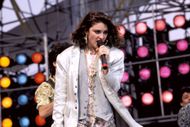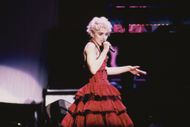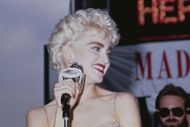The Queen of Pop, Madonna, did not just ascend the 1980s pop ranks; she remapped the cultural landscape in the process. Her entrance onto the stage was as much a musical arrival as it was a statement of artistic independence at a time when pop was undergoing a redefinition.
Fusing mass appeal with club-oriented, dark styles, she built an image that was both inflammatory and cosmically appealing. Madonna wasn't only reflecting the spirit of the decade; she was actively remaking it, and her appearance, voice, and message were coming to be forces of change that would echo across music, fashion, and feminism for decades.

Madonna's initial recordings captured the essence of New York's crazy creativity during the late '70s and early '80s, taking a cue from the wide range of scenes she engaged with. She grew up in a city alive with artistic insurrection, so she soaked it all up, everything from the raw intensity of downtown punk to the sparkling beats of disco dance floors.
That cultural clash went into her earliest releases, in which no one style held sway. Her debut album didn't simply introduce a pop icon; it amplified a voice formed through street determination, club extravagance, and an irrepressible need to bring style into harmony with content. It wasn't so much about belonging as it was about seizing the urban patchwork self that never kept still.
The rise of Madonna
Madonna's cultural impact on popular music and popular culture isn't only legendary, it's foundational. Raised in a working-class Michigan family, she reimagined herself as an international icon by force of personality, self-remaking, and a quick awareness of the cultural zeitgeist.
Breaking onto the scene during the early 1980s, she set herself apart from her peers by embracing controversy, promoting self-expression, and redefining what it meant to be a female pop artist.
With every generation, she remade not only her image and sound but also what women in the entertainment business could look forward to. And in addition to being a number-one recording artist, Madonna became a culture disruptor, rewriting the rules with every step she made.

Madonna's first self-titled album (Madonna) was not only a breakthrough, but it also ignited a pop revolution. Released when the music scene was ready for revolution, it opened the door for a new breed of artist: fearless, fashion-forward, and totally in charge of her image. Laden with dance anthems and a voice full of attitude and s*xual appeal, the album resonated on club dance floors and across radio waves.
With its unbeatable bright production and genre-transcending sound, it caught the spirit of the early '80s and foreshadowed the career legacy of Madonna. Singles like Holiday and Borderline not only dominated the charts, they created a generation's playlist and announced the arrival of pop's next lasting icon.
Read More: 12 songs that capture Doechii’s genre-bending brilliance
Madonna's bold ascent through the '80s
Madonna ruled the '80s, and it needs special recognition. When Like a Virgin came onto store shelves in 1984, it did not merely herald the advent of Madonna; it rewrote the rules about what pop music might accomplish. Rather than dancing around the issues, she jumped into them, mashing pointed words with irretrievably catchy hooks that moved to instant occupancy within the cultural psyche of the times.
With Nile Rodgers at the helm of production, the album displayed a rich amalgamation of styles, from the brassy swagger of Material Girl to the thudding beat of Into the Groove, cementing her status as both business trendsetter and chameleon.

Hardly two years on, True Blue brought us another Madonna: more introspective and richly textured. Married to then-husband Sean Penn at the time, the 1986 album pushed deeper into narrative storytelling, addressing themes of personal responsibility and societal expectation in songs such as Papa Don't Preach.
Its sonic eclecticism, ranging from retro pop to ballad melodrama, demonstrated her artistic development and indicated that Madonna wasn't merely reaching for the hit; she was building her legacy.
Madonna's 1989 album Like a Prayer was a career highlight of musical experimentation combined with a brash cultural critique, daring to disturb. Its title track, that iconic combination of gospel and pop, was just the beginning. Its accompanying music video, exploring complex questions of race, religion, and boldness, caused outrage and admiration.
These were the years that saw Madonna boldly go where she had never gone before, combining art and social discourse. Her songs became a platform where she could explore rich, often challenging ideas, solidifying her place as an artist who never shied from challenging conformity and sparking controversy.
Read More: Top 10 Cardi B songs that defined her career
Madonna's musical journey throughout the years
Madonna first appeared on Broadway in 1988 for Speed-the-Plow at the Royale Theatre. In January 1989, she signed on to promote Pepsi and starred in an ad for Like a Prayer. The ad, placing ribald photos over Catholic icons, was widely despised and forced Pepsi back from the deal. Despite the furor, Like a Prayer became an enormous commercial success, topping the charts globally.
Her Like a Prayer album, co-produced by Stephen Bray, Prince, and Patrick Leonard, also came under fire, receiving the "close to art" review in Rolling Stone and accolades for the rightful gravitas of Madonna as an artist.
More than 15 million copies sold and some number one hits to show for it, like Cherish and Express Yourself. Madonna was declared "Artist of the Decade" at the decade's end by Billboard, MTV, and Musician magazine.

Madonna appeared in Dick Tracy with Warren Beatty in 1990 and released the soundtrack album, I'm Breathless. It included Vogue, a pop sensation, and cemented Madonna's status in popular culture. She then went on the Blond Ambition World Tour towards the latter part of the year, which was a critical, provocative, and s*xually explicit performance, especially on her version of Like a Virgin.
Its live recording was awarded a Grammy Award as Madonna's very first. Her own initial greatest hits collection, however, The Immaculate Collection, included songs such as Justify My Love, itself banned on MTV as too bold.
Madonna's success in the 1990s also continued to develop further, moving on to more explicit and sleazier fare. Her album Erotica and coffee table book, S*x, caused enormous media indignation, but millions of copies of the book were sold. Her Erotica album performed worse, though singles such as Deeper and Deeper kept her in the tabloids.

She softened her image in 1994 with Bedtime Stories, creating such hits as Take a Bow, her longest-running number-one single of her career to date. She was a 1996 Golden Globe winner for her portrayal of Eva Perón in Evita, and the title soundtrack album to the film, featuring such popular songs as Don't Cry for Me Argentina, was a global phenomenon as well.
Blending work and family life went hand-in-hand with beginning a new life with the 1997 wedding of film director Guy Ritchie to her. Madonna's seventh studio album, Ray of Light (1998), was a sonic and visual breakthrough.
Collaborating with producer William Orbit, Madonna aimed to blend dance music, pop, and Brit rock. Madonna was longing for a warm, singer-songwriter sound, the antithesis of dark, experimental '90s techno.
The album was widely critically acclaimed, Slant Magazine dubbing it one of the decade's best pop albums. The album paid Madonna four Grammys, two of which were for Best Pop Album and Best Dance Recording, and over 16 million copies sold worldwide. Frozen, her debut single release, entered the UK chart at number one, and so did the title track.

Commercially, Ray of Light was a success in all the countries' charts. Madonna even established the Ray of Light Foundation, with missions for education, women's empowerment, and world development. She even penned Beautiful Stranger for Austin Powers: The Spy Who Shagged Me the following year, which was awarded a Grammy.
Madonna also starred in films. In 2000, the pop queen, Madonna, starred in The Next Best Thing, and the film was a brief success. She also released her eighth studio album, Music, which continued the electronica-heavy trend of Ray of Light. Music was both a commercial and critical success, hitting charts worldwide, and the title track was a global hit.
Her ninth studio album, American Life, in 2003, reflected the life experience she had gained in America. Although acclaimed for its experimental nature, it was the worst-selling record throughout her career until then. The controversial music video for the title track featuring anti-war imagery was pulled following the start of the war in Iraq.

She next put out Remixed & Revisited, an EP of remixed songs and the long-unreleased song Your Honesty. In addition to the music, Madonna dipped her toe in children's books with The English Roses, which was a bestseller, and donated all of the proceeds to charity.
Her 2005 Confessions on a Dance Floor was a commercial and critical hit, and the top-ten hit Hung Up swept the boards on international charts. On her Confessions Tour, she used religious imagery to the point of transgression, raking in over 193 million, the largest-grossing tour by a female artist at the time.
Read More: 10 most popular Madonna songs of all time
Madonna's upcoming work
Later in 2024, Madonna was engrossed in songwriting with Stuart Price, calling the experience "medicine for my soul." Following her frustration over producers' demands that she tone down her biographical movie, she took comfort in music, where she could express herself freely without external constraints.

By February 2025, she announced that she was in the process of working on a follow-up album to Confessions on a Dance Floor (2005), with Price again producing the album. This return to music reinstated her desire to be creative, with the album providing a fresh chapter in her career.
Read More: The 10 greatest Pink Floyd songs of all time
The legacy of Madonna
Madonna's musical legacy is unparalleled, and her impact on mass culture remains profound. She has been hailed Queen of Pop and not only redefined the image of pop music but also set a higher standard for artistic liberty, innovation, and autonomy. With each album and era, she shattered conventions, introducing tough imagery, fresh sounds, and scandalous themes that appealed to the multitudes globally.

Madonna's unapologetic self-reinvention, visually and aurally, is the benchmark for all artists across generations to experiment and be themselves. From her pioneering experimentation with the music video medium to genre-bending sounds, she is an icon of empowerment, a symbol of the healing power of music, and an unforgettable figure on the world's musical stage.
Read More: 12 Adele songs that made her a Queen of Soul-Pop
Madonna's career as an artist has been one constant cycle of risk-taking reimaginings, unflappable determination, and continuous transformation. From her debut '80s poppy-hit singles to pushing the boundaries in electronic, dance, and avant-garde sounds, she always managed to keep one step ahead of the trend as a music trendsetter.
Through the decades, Madonna's repertoire has been timeless, and she continues to be a force of influence in the music industry today. With each album, tour, and live show, she's solidified her place as one of the greatest and most life-altering and affecting performers in pop music history, and she will go on to inspire generations.
Keep reading SoapCentral for more informative content!
Also Read: 8 must-listen Elvis Presley songs of all time
